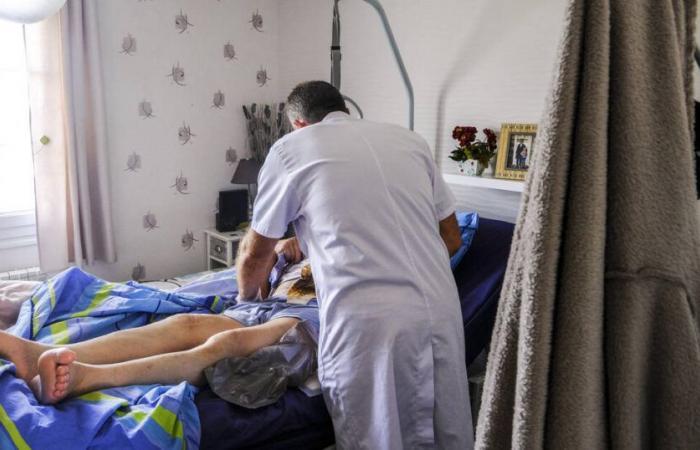Every morning, it's the same routine for Julie. The forty-year-old, who has been a home helper since 2011, quickly browses her schedule online, taking the time to check for possible changes, as often happens. A colleague's car breaking down or a sick leave is enough to turn her day upside down. Around 8 a.m., it's time to hit the road. This Friday morning, she has four people to see, mainly elderly people. Two more will follow in the afternoon.
Lots of costs to advance or cover
Toilet, breakfast, housekeeping… The timing is tight, but after thirteen years in the profession, attached to the intercommunal social action center (Cias) of Morcenx, in the Landes, Julie is experienced. «You can travel up to 60 km in a working dayyou have to be organized. It’s all the more important since I work with my personal car”she reports, listing all the disadvantages of this situation. “In winter, starting problems are recurring on my small car. She’s not very young anymore, but I can’t afford to buy another one.” She also remembers this time when she had a flat tire in the middle of a work day. “I had to borrow my son's bike so as not to miss my tour. When I poached, I was in pain everywhere and what’s more, I had to change the wheel myself to limit costs.”
To upgrade these linking professions which, very often, struggle to recruit, the Landes department launched a study in 2022 on the mobility needs of home help. After surveying 800 people, a new system was designed, based on an observation: the obligation to own a personal vehicle is very often a barrier to hiring. More anchored in the reality on the ground, the future system thus provides for the deployment, in 2025, of a fleet of service vehicles, license-free vehicles and electric bicycles. For Landes home helpers, this is a major step forward in improving their working conditions. Most of them must in fact systematically advance, or even take responsibility for, the costs of fuel, oil changes, repairs, insurance or breakdowns. “To go further, we also thought about how to better integrate people who encounter difficulties returning to employment. We therefore expect a strong demand for cars without a license because getting your driving license has a significant cost.points out Paul Carrère, deputy vice-president for autonomy. In total, the project represents between 4 and 5 million investment for the community.
“We remain their main confidants”
In the South-West department, which has more than 430,000 inhabitants, the challenge is all the greater as the territory welcomes new arrivals every year, particularly on the coast and mostly young retirees or working people at the end of their careers. career. “By 2050, it is estimated that the number of Landais over 75 will practically double. This figure is a warning signal that we take seriously. It reflects the future lack of professionals and the financial difficulties that we could experience if the number of our structures for the elderly and our services do not change.analyzes Paul Carrère. As part of its “Aging Well” plan, implemented in the region since 2019, the community also offers assistance for professionals to obtain their license as well as services to keep elderly or disabled people at home as long as they can. . This includes lighting the room at night, introduction to digital tablets, carrying medications, etc.
“With a car whose wear and tear I wouldn't have to deal with, I could make many more journeys with the beneficiaries I support. For example, we could take them to see friends”rejoices Julie, convinced that a boost in mobility can help break isolation and strengthen ties with the elderly. “Often, we notice that they are watching our arrival from the window, because they don't see many people. The difficulty is that elderly beneficiaries are living longer and longer and more and more are separated from their families. Their children and grandchildren have moved far away, sometimes several hundred kilometers away. Result, we remain their main confidants”illustrates Aurore, a home helper attached to Cias Landes d'Armagnac. For the most dependent, he sometimes goes to the same person up to three times a day. “Without this assistance for staying at home, it is certain that many of our seniors would no longer be able to stay at home and would end up alone in overcrowded establishments.”






